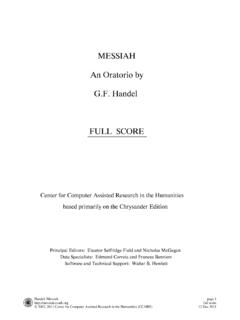Transcription of False Jewish Messiahs - Israel In Prophecy
1 The Downfalls of Jewish Mysticism: False Jewish Messiahs , Kabbalah & the New Age Kabbalah is a snare of the devil that developed Talmudic and Medieval times, becoming popular in Spain with the writing of the Zohar in the 13th century. It spread in Western and Eastern Europe as Jews were affected by: 1. Their difficult life in exile in the Early and Middle Ages under forced poverty and persecution. 2. Corrupted interpretation of Biblical Messianic prophecies to prevent Yeshua from being identified along with the removal of Messianic texts such as Isaiah 53 from the regular cycle of synagogue readings.
2 3. Alienation from Talmudic exegesis combined with erroneous descriptions of messiah s purpose as harbinger of a new Law and what these changes would mean 4. Attraction to spiritism, mysticism, esoteric secret knowledge, and fascination with alchemy and magic. 5. Hunger for the messiah and puzzlement at his delay in the face of Jewish suffering as evidenced by this document (a first response to the announcement of a new prophet among the Saracens (Arabs), Mohammed). 6. The persistence of belief that messiah would be a political deliverer that would re-gather the people in the land, deliver them from their enemies, restore the nation and reinstate the Temple worship in Jerusalem.
3 7. The repeated failed messianic expectations from False Messiahs such as, among others: Shimon Bar Kosiba supported by rabbi Akiva who started the Sabatian movement (1st century) The infamous Shabtai Zvi (Sabbatai Zvi), promoted by his prophet Nathan of Gaza in the Ottoman Empire, (7th century) who started the line of Sabbatian line of Messiahs until Jacob Frank. See The three Persian Messiahs : Abu Isa (Isha ben Ya'kub Obadiah Abu 'Isa al-Isfahani) , called himself the forerunner of messiah , Yudghan (Judah of Hamadan), and his son Mushka who were influenced by Sufism and Islam, spiritualized the Torah, declared laws of Sabbath and Festivals not binding in the Diaspora and declared both Jesus and Mohammed prophets (7th-11th centuries) Serenus of Syria (8th century) Serenus is the latin form of Sha re Zedek.
4 His name is also rendered as Severus by Gregorius bar Hebraeus. He abolished prayer, the ketubah and some of the incest laws and also promised the return of Jews to their promised land, causing many Spanish Jews to emigrate to Palestine. Natronai Gaon in a responsum gives a life account and exposes his False messiahship. The Yemenite Messiahs (12th Century): the messiah of Bayhan, Suleiman Jamal, Shukr Kuhayl I, Yehuda b. Shalom, Shukr Kuhayl II, Yusuf Abdallah. One of them is documented here: 12th century: David Alroy claimed to be a descendent of David was born in Bagdad during the Crusades. His False messiahship is documented at: Abraham ben Samuel Abulafia, a speculative mystic from Saragossa, Spain who developed a system of meditation focusing on letter combinations made False messianic claims based on the kabbalah.
5 See: He lived at the time when the Zohar was composed (principally, at least) by Rabbi Moses de Leon of Guadalajara, Spain, around 1280-86, spreading what was kept secret knowledge. This knowledge interpreted Targumic passages on the messiah . Even Nachmanides (RAMBAN) was accused of breaking the secret in his Torah commentaries. David Re uveni whose appearance in Spain, bringing legends of the lost tribes from the East impressed Viterbo and Clemens in the Vatican, the King of Portugal and Jewish authorities of Europe monarchs during the Inquisition. A Portuguese courtier of Jewish 30/09/2005 1/7 heritage, Diogo Pires, was caught up in the drama, circumcised himself, changed his name to Shlomo Molkho, traveled with Re uveni and by himself, impressing leading figures legalists and mystics with his devotion and miraculous learning.
6 His reputation and the power of his message was temporarily magnified by Charles execution of him in the bonfires of the Inquisition, a holy burnt offering which the foremost rabbinic authority of the time, R. Yosef Karo, yearned to become. Molkho made a strong impression on the two Messiahs of Safed in the Galilee Isaac Luria and his successor Hayim Vital (15th-16th centuries). They were heavily steeped in the Kabbalah. Barukhia Russo/Osman Baba called the second after Shabtai Zvi (Sabbatian line) extended in his movement the antinomian theme (conversion to Islam, or Christianity, even reversing the 10 commandments!)
7 !!), thus expanding the depths of social hiddenness of the group of his followers and enshrining its duplicitous identity. Jacob Joseph Frank was the third in the Sabbatian line and his movement (the Frankists) spread the deception to all Europe became one of the roots of the of modern Jewish movements including the Enlightenment (Haskalah), Reform Judaism, and Hasidism. His daughter Eva became the only female Jewish messiah . The long chain of Hasidic Messiahs such as Israel ben Eliezer, Israel Baal Shem Tov, Rav. Nachman of Bratslav of the Besht Rabbinate, and the most recent in Brooklyn Rebbe Menachem Mendel Schneersohn (1902-1994) of the Lubavitch Rabbinate (Chabad movement) Additional biographical information on False claimants of Messiahship throughout history can be found there concerning the following in their historical contexts.
8 Judas the Galilean The Samaritan Prophet King Herod Agrippa The Egyptian Prophet Anonymous prophet Menahem Vespasian Simon bar Giora Jonathan the Weaver Lukuas (not same Luke as NT) Moses of Crete Moses al-Dar i Asher L mmlin Moses Guibbory Judgment and Curse on the Nation: God indicted Israel and punished it through the Temple's Destruction, the expulsion from the land, and the veil on the nation as a judgment on the False shepherds. Israel & Judah plunged into darkness, with all sorts of error and division, as the light of His Spirit was poured on Yeshua s apostles and the Messianic church.
9 Religious rulers in the Diaspora set up an apostate system called Rabbinic Judaism. False Shepherds & the Good Shepherd All Jewish leaders who have rejected the Messiahship of Yeshua fit the prophetic profile of False shepherds. (Jer 8:8, Jer 10: 21, Jer 12:10, Jer 2:22, Jer 23:1-3, Jer 25:33-37, Jer 50:5-7, Ezk 34:1-3, Ezk 7-10, Zec 10:2-4, Zec 11:4-17.) But also the Lord supplied the Good Shepherd whom He had promised (Jer 3:14-18) Yeshua is He (John 10). 30/09/2005 2/7 The Veil Yeshua said, I have come in my Father's name, and you do not accept me; but if someone else comes in his own name, you will accept him.
10 (John 5:43) A veil has resulted from the Messianic rejection (Is 6:9-13, Is 42:18-19, Is 56:10-11). This veil makes it difficult for the Jews to see messiah Yeshua. The image is marred by centuries of False teaching and persecution, while messiah became the light of the Gentiles. But the veil is only for a time, until the time of the Gentiles be fulfilled (2 Cor 3:15-16, Rom 11:25, Rom 9:33, 1 Peter 2:8, Rom 11). Maimonides on messiah See what Maimonides said about Jewish Messiahs in Harris Lonowitz online article entitled The Two Jewish Messiahs . See Maimonides on messiah Here is an extract: Maimonides, in particular, engaged the topic of the messiah in several responses to letters of inquiry or reports relating to five events.









